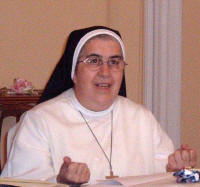|

The year of faith with high spiritual tone celebrations is gone. A
particularly challenging year. Pope Ratzinger, who knows the effort to
believe, in his unconditional love for Christ, the Church, men and women
all over the globe, has launched this year with a special motu
proprio. In it he writes: "The 'door of faith' is always open to us.
And it is possible to cross that threshold when the word of God is
proclaimed and the heart let to be molded by transforming grace. To
cross that door leads to get into a path that lasts a lifetime."
We asked a few questions, starting precisely from the Motu proprio
to M. Viviana Ballarin, former General Prioress of her Institute - the
Dominican Sisters of St. Catherine of Siena - for several mandates, USMI
President since 2008, Vice President UCESM since 2011, working since
decades in the animation of religious life, especially for women.
The Year of Faith is an invitation to an authentic and renewed
conversion to the Lord, the one Saviour of the world. What paths do you
propose (or would you propose) so that the religious life live this
conversion? (No. 6)
"The faith, that becomes active through love, becomes a new criterion of
understanding and action that changes the life of man." (No. 6)
This is the way!
The Holy Father, through the proclamation and celebration of a year
dedicated to faith, wants us to understand that being a Christian does
not mean that you know everything about Christianity, but rather that
you establish a special and experiential relationship with the Person of
Christ; it means to meet, attend, stay with him, live with him, let him
be a presence that involves our whole life in His concerns, which are
the things of the Father: to do all men and all women of all time, as
his sons and his daughters.
The Holy Father himself proposes the way. We religious are called to be
attentive, to listen attentively, to ensure that faith really becomes
our criterion of reading of history to discover in it the presence of
the Risen Christ who lives and is alive here now (11), because our
actions become more and more the story of a received love, an experience
of grace and joy, becoming witness capable of generating, to transform,
to convert (see No. 7).
What are the reasons that, according to you, today, can convey a full,
existential return to the Lord, without easy illusions? (No. 6)
"The renewal of the Church passes through the witness offered by the
life of believers." (No. 6)
The men and women of our time live very casually, sometimes falling prey
to subtle manipulations and plagiarism due to severe conditions that
afflict our society in crisis, due to the fall of the founding values
of
human existence’s meaning, because of what the Holy Father calls "a
changed mentality which, especially today, reduces the scope of rational
certainties to that of scientific and technological achievements"
(n. 12), because of the separation that is getting wider between faith
and life.
We wonder if there is still space for a dialogue between science and
faith, to make free and responsible choices, to live hope.
More than ever, the consecrated life that for a vocation is a "living
memory of the gospel," is challenged to have all in order to be a great
motivation carrier the return of many brothers to the Lord.
This is not doing, but being.
What are the bottom lines that must guide the discovery and study of the
fundamental contents of faith? (11)
The Holy Father defines the Catechism of the Catholic Church, 20 years
after its promulgation "valid and legitimate instrument for ecclesial
communion and a sure norm for teaching the faith" in which "page after
page it finds out that what is presented is not a theory, but an
encounter with a person who lives in the Church", it is therefore "a
valuable and indispensable help" (11).
These statements are simply stunning and orienting.
Furthermore, the Pope states that the knowledge of faith’s content is
essential to comply fully with intellect and will to what the Church
proposes and thus to enter and experience the fullness of the saving
mystery revealed by God in Jesus Christ.
The bottom line is that the Holy Father continually presents us and
insists that faith is a matter of a personal encounter with the Person
of Jesus. Study and systematic knowledge of the faith’s content
sustains and accompanies the MEETING CHANGING LIFE.
Today, as yesterday, Christ invites us to the ways of the world to
proclaim the Gospel to all peoples. What are the practical ways that the
Gospel really come to all? ... How do explain today, in this
multifaceted, fluid and complex society, the strength and beauty of the
faith? (No.4)
Someone said that the consecrated life is called, especially in our
days, to be the narrative Gospel. I am increasingly convinced that
forward way is really to tell the Gospel by living without 'ifs' and
'but'.
This statement may seem simplistic and obvious, but it is not.
Jesus’ proposal: his Gospel is love, love that is freely and without
measure. Love, sooner or later wins, it never ends - Saint Paul says.
When there is love and it is genuine, it reaches the other, touches him,
change him. Nothing can stop true love. Love can bring down any form of
barrier, put also by our multiform, fluid and complex society.
Condividi su:




|